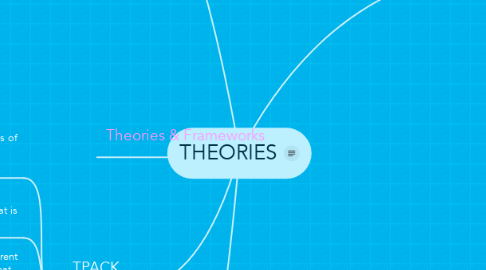
1. TPACK
1.1. TPACK states that teachers need three kinds of knowledge : Content, pedagogical and technological.
1.2. This statement is supported by the framework of knowledge intersections that is TPACK.
1.3. The value of importance of the three different kinds of knowledge changes based on what combination they are being used in.
1.4. Effectiveness of education can be measured by how well teachers can make use of TPACK.
1.5. It's not a static evaluation. As the teacher's knowledge and familiarity increase, so will their skill.
2. Philosophy of Teachnology
2.1. The philosophical aspect of this concept allows for the subjectivity of the teacher to play a role.
2.2. Breaking free of the "what you see is what you get" idea of a classroom and its' resources.
2.3. Teachers can express their owns philosophies through social networking sites of their choice.
2.4. A connection between online and in-the- classroom development is established and both are explored and developed.
3. TECHNOLOGY THEORIES
3.1. MEDIA ECOLOGY
3.1.1. Implies that technology acts as an environmental element which then shapes human behavior and social constructs.
3.1.2. Technology shapes and effects our cognitive filter.
3.1.3. In the context of education, this theory implies that because students (and also some teachers) are so functionally molded by a technology-driven society, using technology in the classroom would introduce a working medium with which the students could readily associate themselves.
3.1.4. Suggests the opposite theory of SCOT.
3.2. SCOT
3.2.1. Human behavior and tendencies shaping technological evolution.
3.2.2. Society controlling the evolution of technology
3.2.3. Social patterns of demand dictate which technologies succeed or fail.
3.2.4. In the context of education, this theory implies teachers needing to keep up to date with popular technologies used by their students as to ensure effective engagement in assignments.
4. Theories & Frameworks
5. LEARNING THEORIES
5.1. CONSTRUCTIVISM
5.1.1. LEARNING IS ACTIVE, not static.
5.1.2. Knowledge is essentially constructed by those who are learning.
5.1.3. Teachers act as facilitators of knowledge acquisition rather than deliverers.
5.1.4. Because constructive learning is so personal, each student brings their own experience and interpretive filter with them.
5.2. CONNECTIVISM
5.2.1. This theory implies that knowldege is a tangible thing that already exists in the universe, and that we must go out and find it.
5.2.2. Teachers play the role of 'presenter of knowledge', and are to engage in activities that allow the student to discover information, on their own as well.
5.2.3. The CONNECTIONS made between various chunks of information discovered by the learner and what allow them to learn. Thus, CONNECTIVISM.
5.2.4. LEARNING IS ACTIVE, not static
5.3. COGNITIVE LOAD
5.3.1. Working memory is used when we are acquiring information and transferring it our long-term memory where it will be stored.
5.3.2. Overwhelming one's working memory with too much information, impairs one's ability to absorb the info, and commit it to one's long-term memory.
5.3.3. Regarding education, teachers need to make sure they aren't overloading their students with too much new information, or the above-mentioned overwhelming will occur, and the lessons will be rendered useless.
